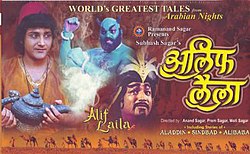This article has multiple issues. Please help improve it or discuss these issues on the talk page . (Learn how and when to remove these messages)
|
| Alif Laila | |
|---|---|
 | |
| Also known as | Arabian Nights |
| Genre | Fantasy |
| Based on | One Thousand and One Nights |
| Screenplay by | Ramanand Sagar |
| Directed by |
|
| Theme music composer | Ravindra Jain |
| Opening theme | Krishna M. Gupta |
| Ending theme | Krishna M. Gupta |
| Composer | Ravindra Jain |
| Country of origin | India |
| Original languages |
|
| No. of seasons | 2 |
| No. of episodes | 303 |
| Production | |
| Producer | Subhash Sagar |
| Running time | 22 Minutes |
| Production company | Sagar Arts |
| Original release | |
| Network | |
| Release | 1993 – 2002 |
Alif Laila is an Indian television series based on the One Thousand and One Nights , also known as the Arabian Nights. [1] It was produced by Sagar Arts. [2] It was made in two seasons. The series from 1993 to 2002 for 303 episodes on DD National and later on SAB TV.
Contents
- Stories
- Season 1 (1993–1997) on DD1
- Season 2 (2001–2002) on SAB TV
- Cast
- Main
- Recurring
- Home media
- Broadcast
- References
- External links
The plotline of the series starts from the very beginning when Shahrzad starts telling stories to Shahryar and contains both the well-known and the lesser-known stories from the One Thousand and One Nights which are mentioned here. The name Alif Laila is a short form of the original Arabic title of the One Thousand and One Nights - Alif Layla wa-Layla (Arabic : ألف ليلة وليلة).